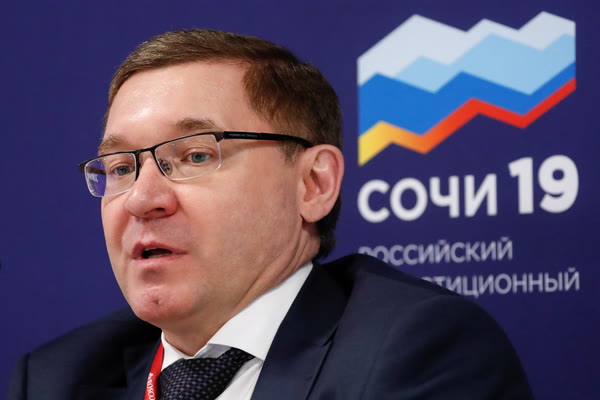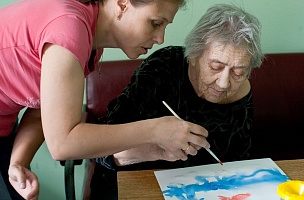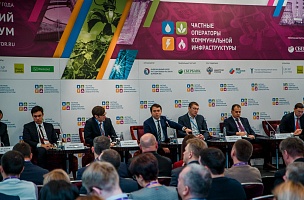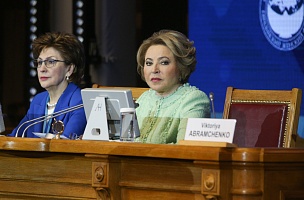KEY CONCLUSIONS
The Smart City project: a priority for national development
“We are developing the Safe City software complex. <...> This is a huge resource that we already have,” Vladimir Yakushev, Minister of Construction, Housing, and Utilities of the Russian Federation.
“[The Smart City - Ed.] has become one of the priorities for national development. <...> 15 federal territories have not only featured the Smart City theme on their stands as one of their priorities, but have already shown what is being done in these regions in practical terms,” Andrey Chibis, Deputy Minister of Construction, Housing and Utilities of the Russian Federation.
“A smart city is about solutions for people, solutions that improve quality of life, safety, and human performance,” Vladimir Dmitriev, General Director, Kalashnikov Concern.
“Gorod.RF wants to start with the implementation of three programmes. The first is to increase the efficiency of housing and public utilities, the second, that of healthcare, and the third, that of the environment,” Sergey Kalugin, Adviser to the Chairman, State Development Corporation "VEB.RF".
Regions successfully implementing smart city processes
“In many regions, good processes have been developed, and many information systems have been implemented that improve the efficiency of housing and utilities and of the traffic situation,” Vladimir Yakushev, Minister of Construction, Housing, and Utilities of the Russian Federation.
“My team’s job is to create a positive microclimate in my city <...> Three key success factors: first, this is a team, second, expertise: you need to train the teams, there must be people from IT. And the third factor is involvement, you need to work with people,” Dmitry Razumovsky, Mayor of Kaluga City.
“In 10 days, the Sochi transport maps have been updated; here you need to create a centre where the best innovations and solutions are born, and distribute them to other cities,” Valentina Fedoseeva, Partner, EY.
“Sosnovy Bor will launch unmanned vehicles. Gatchina has progressed in creating a single city portal and begun to build ‘IQ Quarters’ with smart utilities management systems,” Alexander Drozdenko, Governor of Leningrad Region.
Business is interested in participating in the Smart City project
“For us [the Smart City project - Ed.] is a business, we have accumulated good expertise, a portfolio of ideas implemented in Bryansk, Novgorod, and Pskov,” Gevork Vermishyan, Chief Executive Officer, MegaFon.
“Russia is an important market. Now is an important moment for concluding contracts with Russian companies and municipalities. We are introducing a whole range of innovations in financing Smart City projects,” Diane Galbe, Senior Executive Vice President, SUEZ.
“The struggle for talents and people is the main reason why we support the Smart City project,” Kseniya Sukhotina, General Director, Rusatom Smart Utilities Ltd.
“Urbanization is progressing rapidly, we understand that the whole economy is going in that direction, and for us the transformation of the urban environment is the formation of a market with the manufacture of a large number of products <...> we have something to offer,” Vasily Brovko, Director for Special Commissions, Rostec.
“Working with a large number of operating organizations throughout the country, we understand well the problem and the specifics that they face. <...> Creating a Smart City system provides insights, including on real line losses. By processing these, we can move from a standard to a fact, and this is a giant step in the development of this industry,” Lev Gorilovskiy, Member of the Board of Directors, Polyplastic Group.
“For us, a smart city is a new market. Smart cities are what we do. We will create the infrastructure for smart cities,” Andrey Kuzyaev, President, Chairman of the Management Board, Member of the Board of Directors, ER-Telecom Holding.
PROBLEMS
Insufficient data exchange between participants of the Smart City project
“The absence of a unified architecture [between the federal centre, regions and the municipality - Ed.] means we cannot move more actively and use the resources that have already been spent,” Vladimir Yakushev, Minister of Construction, Housing, and Utilities of the Russian Federation.
“It is something of a challenge in terms of the exchange of practices and best knowledge. It was difficult to establish a horizontal relationship about the experience of successful and unsuccessful projects,” Boris Glazkov, Vice-president, Rostelekom.
“It is important for us that the percentage of raw, open data is as large as possible, because this is sound. <...> If we try any solutions that are closed from the point of view of data exchange, then we understand that we will reach a dead end," Kseniya Sukhotina, General Director, Rusatom Smart Utilities Ltd.
Lack of funds and trust between the authorities, business, and society
“The problem areas that force us to revise our approach to implementing the Smart City project are the long-term crisis of trust among residents, business, and government, the budget deficit <...> and analysis of the requirements of different social groups for the long-term development of the city,” Alexander Brechalov, Head of the Udmurt Republic.
SOLUTIONS
Creating a mechanism for sharing data and best practices between project participants
“Setting new tasks and proposing new practices is the most correct approach. <...> It is best when the federal ministry is used as a platform, which can, with the help of regulatory documents, provide room for manoeuvre. <...> To take the best practices and provide the opportunity for other regions to make use of these practices,” Vladimir Yakushev, Minister of Construction, Housing, and Utilities of the Russian Federation.
“The aggregation of decisions, the exchange of decisions is of great interest because it is one of the promising ways to move forward,” Evgeniy Kovnir, General Director, Digital Economy.
“We will try to exert maximum efforts so that the mechanism of the best practices is consolidated at the federal level, fixed, and so within the framework of the ‘Digital Economy’ programme there are also some mechanisms, including financial incentives, in place to accelerate the process of applying best practices,” Evgeniy Kovnir, General Director, Digital Economy.
Creating the conditions for more active participation in the project by businesses and citizens
“Business is very seriously involved in digitalization, because it holds a significant part of its expertise. Funds from businesses can also work on the digitization of the urban economy and the development of the Smart City. For example, some projects can be done for free, in a win-win scenario. <...> There is also the idea of public-private partnership,” Evgeniy Kovnir, General Director, Digital Economy.
“We need a development strategy for the city of Sochi, based on real data, synchronized within this city, and supported by city residents, businesses, and experts,” Oksana Demchenko, Head, National Competence Centre for Smart Cities.
Introducing domestically produced solutions
“It is important that the solutions [used in the implementation of the Smart City project - Ed.] are domestically produced, because there is a lot of infrastructure that can be vulnerable, and I believe that homegrown IT solutions for smart cities are very important, and this is where the future lies,” Alexander Ivanov, General Director, Vostok; Founder, Chief Executive Officer, Waves Platform.
“We need not only to expand the pool of practices [in the implementation of the Smart City project] that exist, but also not to be afraid to experiment [create new ones - Ed.],” Anton Petrakov, Director for Government Relations, Yandex.
“The decision bank has 219 projects that have been tested in 393 cities, so we are on the right track, everything will work out,” Andrey Chibis, Deputy Minister of Construction, Housing and Utilities of the Russian Federation.
Redistribution of income between marginal and social projects
“Redistribute excess returns [from marginal projects - Ed.] to less marginal or unprofitable areas that have a social effect, but leave this in the corridor that is interesting for a private investor,” Vasily Brovko, Director for Special Commissions, Rostec.
Integrating Russian projects into the international agenda
“We need to not only talk about international experience, but also about the integration of our cities into an international agenda,” Artyom Sedov, General Director, The Big Three (“Bolshaya Troyka”).






